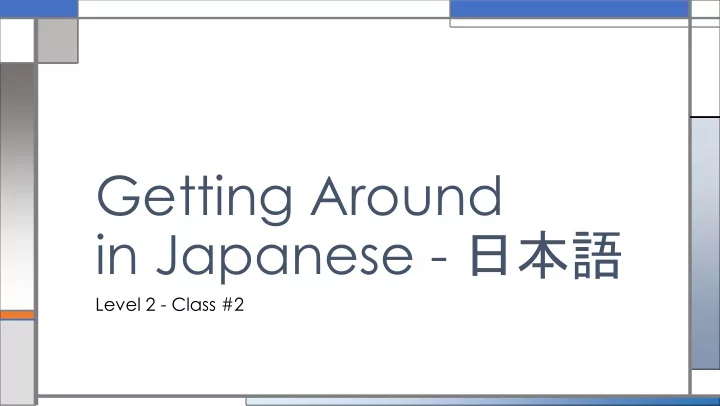

Getting Around in Japanese - 日本語 Level 2 - Class #2
Level 3 Student, teacher, senpai Phrases Okurigana Japanese names TBD Intro to Kanji “Ta” / “ Te ” verbs Months and years Kanji Advantages / based on your Disadvantages Adjective opposites Countries Katakana – Part II interests TBD Past tense People and Family Level 2 More places More about you Want, Like, Need Polite vs. Casual Katakana – Part I Ordering things Masu verbs Time and Days Homonyms This is, that is not Adjective negatives Car, Train, Road Hiragana – Part II What do you like Emphasis / Tone Noun negatives Numbers, Colors Level 1 Beware of Meaning School, Bank, Money Mini introduction Particles wa/wo/no Dakuten ( ゛ ) Handakuten ( ゜ ) Particles / Order Jyanken (game) Verbs I, II, III Food and Drink Why Hiragana What is this, where is it Adjective na/i Mandatory This, That, What, Where Hiragana – Part I This is mine, that is yours “ Gojyuon ” 4 Writing Systems Noun da/desu Me, You, Us Level 0 日本語 About Written Grammar Vocab Japanese Japanese
Today I will focus on: Level 2 More places More about you Want, Like, Need Polite vs. Casual Katakana – Part I Ordering things Masu verbs Time and Days Homonyms This is, that is not Adjective negatives Car, Train, Road Hiragana – Part II What do you like Emphasis / Tone Noun negatives Numbers, Colors 日本語 About Written Grammar Vocab Japanese Japanese
New Nouns – Local Transportation kuruma jitensha 車 くるま 自転車 じてんしゃ Bicycle Car 自転車 車 densha michi 電車 でんしゃ 道 みち Road Train 道 電車
Particles – (Joshi) – de – A means of travel (I will go by bicycle/car/train) • で – de – Location of the sentence (I will wait at the station) • で
Get in / Get on! Go I Car 行く 私 車 で は くるま いく わたし de wa kuruma iku watashi
New Nouns – Local Transportation kuruma jitensha 車 くるま 自転車 じてんしゃ Bicycle Car 自転車 車 densha michi 電車 でんしゃ 道 みち Road Train 道 電車
Demonstrative Pronouns – Not Requiring a Noun • Kore - This (close to speaker) これ • Sore - That (close to listener) それ • Are - That (over there) あれ • Dore? - Which? どれ?
Demonstrative Pronouns – Requiring a Noun • Kono____ この ___ - This____ (close to speaker) • Sono____ その ___ - That____ (close to listener) • Ano____ あの ___ - That____ (far from both) • Dono____? どの ___ ? - Which____?
Location Pronouns • Koko - Here (close to speaker) ここ • Soko - There (close to listener) そこ • Asoko - Over There (far from both) あそこ • Doko? - Where? どこ?
Location Pronouns Demonstrative Dem. w/noun Locations N これ(は) この (は) ここ(は) Close to Speaker kore (wa) kono N (wa) koko (wa) N それ(は) その (は) そこ(は) Close to Listener sore (wa) sono N (wa) soko (wa) N あれ(は) あの (は) あそこ(は) Close to neither are (wa) ano N (wa) asoko (wa) N どれ? どの ? どこ? Question word? dore? dono N ? doko?
Na-adjective Phrase – “I like this” Noun 1 ga Suki (da ・ desu) *Instead of saying “I like baseball” this phrase literally translates to “baseball is likeable (to me) ” Definition: I like N 1 N 1 is something I enjoy Examples: I like cats. Baseball is something I enjoy.
Na-adjective Phrase – “I like this” Noun 1 ga Suki (da ・ desu) (Without Subject) Noun 1 wa Noun 2 ga Suki (da ・ desu) (With Subject)
い Adjective Phrase – “I want this” Noun 1 ga Hoshii (desu) *Instead of saying “I want tea” this phrase literally translates to “tea is wanted ” Definition: I want N 1 N 1 is something I would like (to have) Examples: I want takoyaki. I want a new car.
い Adjective Phrase – “I want this” Noun 1 ga Hoshii (desu) (Without Subject) Watashi wa Noun 1 ga Hoshii (desu) (Only for yourself) *Japanese people use “ Hoshii ” only when speaking about themselves ** There is another expression to say that someone else “appears to want” something
Phrase of the Day Sugoi ・ Omoshiroi ・ Yabai すごい ・ おもしろい ・ やばい Common Translation: “ Wow!” “Interesting” “Damn! Whoa! Crazy!” My thoughts: A casual way react to your friends’ stories, or to something you see Usage: A way to keep the conversation going. Don’t over react, though!!
Questions? Visit my online resources www.writericesensei.com www.facebook.com/WhiteRiceSensei/ www.youtube.com/channel/UCSrQHvLKMsn6eo7dlGdTmtA
Recommend
More recommend